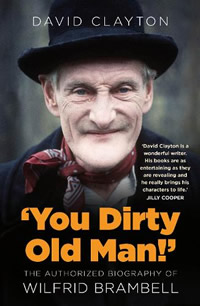 |
|
As Chairman of the Steptoe and Son Appreciation Society (a very grand title for doing very little indeed !!) I had the pleasure of speaking with the author David Clayton prior to publication. He really has done an excellent job at piecing together the life of an actor who, while incredibly well known, nevertheless kept his personal life a closely guarded secret.
To this end, David has done exceptionally well to not only put together and present the life of Wilfrid Brambell, but to do it in a very entertaining way. This is not a long book, for the reasons previously mentioned, but it is a good read and now stands as the definitive story of Willie’s life. It would have been easier to have presented a much longer book which listed all of ‘Old Neverstops’ prolific career, with a synopsis of each production - that would have certainly given David a few more pages to please his publisher. However I am glad he resisted, instead focusing on the actor and his journey from provincial Irish theatre to one of the biggest TV stars of the 60s and 70s. Over the years several people have approached me saying they were going to write Wilfrid’s biography but David has done it, and done it very well indeed – thank you.
There are also lots of nice contributions from the likes of Caroline Seymore, David Lloyd, Joanna Lumley and others. In some instances communications and conversations are repeated verbatim, where I felt perhaps a little judicious editing may have helped. Then again, with so little raw material to work with, I can completely understand the reasons for doing this. A letter from Ian Ogilvy which effectively says ‘sorry, but I am unable to assist you’, helps fill up a quarter of a page !
I did get the impression during my conversations with David, and it appears on occasion in the book, that he is a little embarrassed about some of the things that he as a biographer is required to cover. In some instances, I felt he qualified or justified actions or comments, rather than just putting the fact or statement and letting the reader draw their own conclusions. It is clear that David didn’t shy away from seeking the truth in all instances and his desire to be fair and kind may have ironically left some readers feeling that he was pulling his punches.
He was, of course, somewhat concerned about how we would receive the book title ‘Dirty Old Man’ – well in all honesty what else were you going to call it ? While I feel that Wilfrid would have objected had the book been published during his lifetime, those three words are instantly associated with Albert Steptoe and vicariously therefore with Wilfrid Brambell. Of course I have no doubt that the publisher craved the title, hoping that readers would rush to buy the book, looking for salacious tit-bits about allegations that, to this day, remain unsubstantiated. David does deal with these matters and, in my view, having done his best to find the truth, he presents his findings in a fair and impartial way.
This book at last fills a place on the bookshelves for those interested in reading about entertainment giants from the last century. Even if you are not a fan of Steptoe and Son (hard to imagine) this book is an entertaining and informative read. At last, some 37 years after his death, Wilfrid’s shining career has found its champion in David Clayton. |